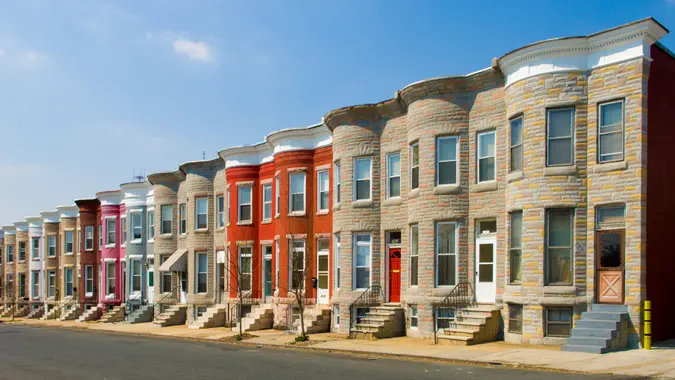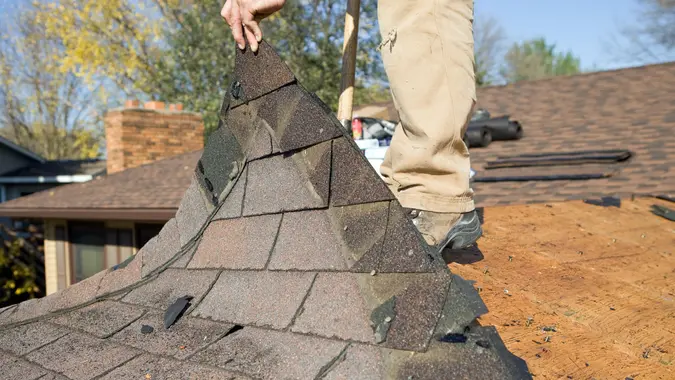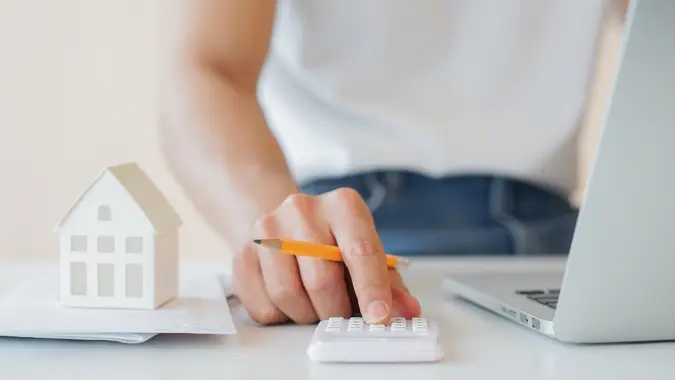Dave Ramsey’s 6 Proven Strategies To Pay Off Your Mortgage Faster

Commitment to Our Readers
GOBankingRates' editorial team is committed to bringing you unbiased reviews and information. We use data-driven methodologies to evaluate financial products and services - our reviews and ratings are not influenced by advertisers. You can read more about our editorial guidelines and our products and services review methodology.

20 Years
Helping You Live Richer

Reviewed
by Experts

Trusted by
Millions of Readers
Paying off your mortgage early can be one of the most powerful financial flexes and steps toward achieving your goals in 2026. While this may seem difficult to achieve, no one explains it better than Dave Ramsey, personal money expert and host of “The Ramsey Show.”
With rising interest rates and long-term debt weighing heavily on homeowners, Ramsey’s advice is more relevant than ever in the coming new year. Whether you’re just starting your homeownership journey or looking to accelerate your payoff, these mortgage payoff tips can help you ditch debt and build wealth faster.
Here are Ramsey’s six actionable strategies to help you pay off your mortgage early and take control of your financial future.
1. Make an Extra House Payment Each Quarter
According to Ramsey, eliminating your mortgage ahead of schedule can save you tens of thousands in interest, reduce financial stress and free up your income for retirement and investing.
When you throw extra money at your monthly mortgage payment, more of each payment after that goes toward your principal balance. Plus, with each extra payment, you’ll be closer to removing private mortgage insurance faster from your loan, if you have it. Once your mortgage’s principal balance is 80% of the original value of your home, you can request the removal of your PMI.
Here’s how extra payments would affect a $220,000, 30-year mortgage with a 4% interest rate:
- Make one extra payment each quarter to shave 11 years and nearly $65,000 off your mortgage.
- Divide your payment by 12 and add that amount to each monthly payment, or pay half of your payment every two weeks. This bi-weekly payment schedule adds up to one extra payment each year, saving you $24,000 and four years off your mortgage.
When you can’t afford that extra payment, just round up your payments so you’re paying at least a few extra dollars each month, and increase your payment when you get a raise or bonus. That little bit extra will save you from paying more interest than you have to.
2. Bring Your Lunch to Work
Bringing a brown-bag lunch to work every day isn’t exactly glamorous, but it will save you money you can put toward paying down your mortgage — to the tune of around $1,200 a year. Using the same example mortgage as before, Ramsey said that extra cash could enable you to pay it off three years early. You’ll also save more than $28,000 in interest.
Another way Ramsey suggests you can put more money toward your mortgage is to remove your daily coffee shop stop — which can really add up. Add that $90 per month you spend on Starbucks to your mortgage payments, and you’ll save $25,000 in interest and reduce your loan by four years.
3. Refinance (Or Just Pretend You Did)
Low-interest rates might make it tempting to stretch out your payments over the course of the entire loan. However, the Dave Ramsey mortgage plan encourages homeowners to aggressively pay off their mortgages early.
One recommendation Ramsey makes is to convert your 30-year mortgage into a fixed-rate, 15-year home loan. Not only will you pay off a 15-year mortgage in half the time, but you’ll also pay much less in interest.
Once you get into that 15-year mortgage, you can increase your payments, if possible, to pay it off in, say, 10 years. Or, if refinancing your 30-year mortgage isn’t feasible, pay toward your mortgage like it’s a 15-year mortgage. Either way, you’ll have more money each month even sooner to invest for retirement, save for college or put toward some other goal.
4. Downsize Your Home
Consider selling your home before paying it off — if you have enough equity in it — and using your profits to buy a smaller, less expensive one. You might be able to pay cash for a new house, and even if you do need to get a mortgage, it will likely be small — and a smaller balance means you can pay it off sooner. In any event, you’ll have successfully reduced your debt.
Ramsey doesn’t recommend that house hunters seek VA loans, which are backed by the Department of Veterans Affairs. They’re usually more expensive than conventional loans, according to Ramsey. The only advantage of the VA house loan is that you don’t need a down payment, which Ramsey considers a trap.
5. Consult a Pro To Find the Right Home
Finding a home on your own takes time and energy. Instead, choose to rely on the expertise of real estate professionals who can help you find the perfect home and negotiate the price on your behalf, so you can be confident you’re getting the best deal possible.
Ramsey’s nationwide Endorsed Local Provider network can help you find a local real estate professional you can trust. The ELPs in the network promise to help you save time and money, so you won’t have to worry about being pressured into buying a home that doesn’t fit your budget.
6. Maximize Your Down Payment
Although Ramsey is an advocate of buying a home with 100% down, not everyone can wait to gather the total amount they need before purchasing a home. The key is to put down a minimum of 10%, or as much as you can, to reduce the amount you’ll need to finance.
Put down 20% and save even more money. When you take out a conventional loan and opt for a down payment of at least 20%, you can avoid having to pay PMI. PMI usually costs between 0.5% and 1% of the mortgage loan amount each year — which equals money you could be adding to your mortgage payment.
Final Take To GO: Don’t Bite Off More Than You Can Chew
At the end of the day, being financially ready to take on the cost of homeownership is the first step to successfully investing in real estate. Ramsey recommends that you be able to answer all of these six questions with a “yes” before committing to a mortgage — otherwise, you should wait to purchase a home:
- Am I free of debt with three to six months of living expenses saved?
- Can I make a 10% to 20% down payment?
- Will I be able to pay the closing costs and moving expenses with cash?
- Is the house payment no more than 25% of my net salary?
- Can I afford to choose a 15-year, fixed-rate mortgage?
- Can I afford to pay the utility and maintenance costs as long as I own the home?
Caitlyn Moorhead and Cynthia Measom contributed to the reporting for this article.
 Written by
Written by  Edited by
Edited by 

























